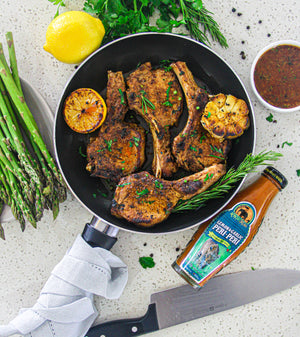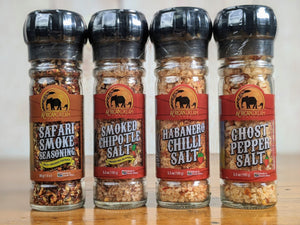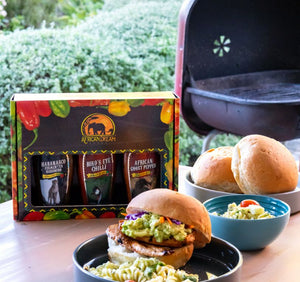Can Ghost Pepper Sauce Hurt You?
Mar 25, 2022
Ghost pepper, also known as bhut jolokia, is a red-orange, naturally growing pepper in Northeastern India and the neighboring country of Bangladesh. Interestingly, though it’s definitely spicy enough to warrant its name, “ghost” is actually a mistranslation. The original Assamese word should have been translated into “Bhutan”, so the name should have literally been “Bhutan pepper”. However, it was mistaken for another word meaning “ghost”, and the name stuck. Can this spooky-sounding ghost pepper sauce hurt you?

Impressively, bhut jolokia once held the Guinness world records for the world’s hottest pepper, though other peppers have dethroned it. Nevertheless, the ghost pepper is still so plenty spicy that many people fear eating it, and for good reason. So, should you eat ghost peppers or condiments made with them? And if you do, will you get hurt? Keep on reading to find out all this and more.
What Happens When You Eat Spicy Food?
Whether you throw on some hot sauce or full-on eat a ghost pepper, this is what happens to your body.

1. Intraoral Phase
Basically, chili peppers contain a chemical called capsaicin. This is the component that makes chili peppers hot and spicy. It can irritate the living heck out of the mouth and skin of any mammal.
How it works:
- Capsaicin binds to the TRPV1 pain receptors on the tongue in addition to free nerve endings responsible for detecting heat.
- Then, these receptors start sending signals to the brain, telling it that something majorly wrong is happening. Something that’s hot and painful.
- Your tongue is tricked by your brain into thinking that it is on fire, so it tries to put out that fire. That’s exactly why you start to feel hot when you eat super hot peppers. It’s also why you start to sweat and pant as if you’ve been through a race.
- Your blood vessels dilate, and you turn red, then your eyes water, you start drooling, and get a runny nose.
- Essentially, you turn into a flushed, sweating, slobbering, crying mess. Simply because your body is trying its best to flush out the irritant while also trying to cool itself down.
So, what do you do when this happens?
You look for the nearest glass of water and try to drown out the spicy heat. Now, while you may think that water can help, it actually can’t. It can only bring about momentary relief, but once it’s gone, the fiery sensation will resume.
But for how long?
Thankfully, the heat won’t last for all that long. For about 20 to 30 minutes, though it may feel like an eternity when you’re in the throes of spiciness. In this period of time, the receptors will dislodge and neutralize the capsaicin chemical. Leaving your mouth completely unscathed.
HOT TIP: Try using ice cream to cool down your mouth!
SEE ALSO: How to Get Rid of Spicy Taste Step by Step
2. Chest Phase
So, is the discomfort over now? Not really.
After you swallow spicy food and it keeps moving through your digestive tract, your body will continue feeling the effects. The capsaicin may start to bind to more pain receptors in the throat and esophagus. Leading to chest pain similar to that of heartburn, aka acid reflux.
Still, it’s important to know that though ghost peppers can feel like they’re burning a hole through your tongue and digestive tract, they’re not actually causing any damage. They’re simply mimicking the effect of an injury. Again, this effect is temporary and will pass, so don’t worry too much.
It’s worth mentioning that spicy foods can cause hiccups on their journey through your alimentary canal. This occurs if capsaicin finds its way to the phrenic nerve and irritates it. Essentially, this nerve feeds the diaphragm, a muscle that separates the chest and abdominal cavities and plays a major role in breathing.
So, when the phrenic nerve is irritated, the diaphragm starts spasming, and the hiccups make their appearance. Still, this doesn’t happen in all people who eat spicy food, though it tends to occur more frequently when ingesting ghost peppers and other very hot peppers.
3. Stomach Phase
Now, when the capsaicin reaches the stomach, the membrane lining it will start producing gastric mucus and other chemicals in order to begin the digestion process. Since the stomach starts putting in some effort, you may occasionally experience cramps or feel some stomach pain. You may even feel nauseous and start vomiting if the food is extremely spicy. However, unless you’ve been eating Carolina Reapers for breakfast, you’ll probably be just fine.
4. Intestine Stage
Once the food passes to your intestines, the capsaicin starts to increase the rate of digestion. A little too fast, some may say. In a nutshell, it makes your intestine draw in lots of water, leading to its forceful distention and contraction. This ultimately may result in abdominal pain and, possibly, an uncomfortable bathroom experience.
Is Ghost Pepper Hot Sauce Good for You?
Since most hot sauces typically contain some measure of capsaicin, then yes, ghost pepper hot sauce can be good for you.
Believe it or not, capsaicin has cancer-fighting properties. It can bind and lead to the death of prostate cancer cells. Moreover, it can decrease the chance of breast cancer metastasis. Now, you’ll only have these great health benefits with high amounts of capsaicin, and what better way to get that than from a daily dose of delicious hot sauce?
Surprisingly, capsaicin has also been shown to have anti-inflammatory properties, which is why it’s sometimes used as an ingredient in topical analgesic creams.
Moreover, it also has the ability to lower blood glucose and cholesterol levels with the added bonus of boosting your mood and metabolism. That’s why many people on their weight loss journey are encouraged to eat spicy food.
All in all, hot sauce can be great for your health, that is, if you can withstand the heat. So, next time you’re cooking your dinner, take the plunge and throw some ghost pepper hot sauce in the mix.
SEE ALSO: Is Hot Sauce Healthy?
Why Do People Like Ghost Pepper Hot Sauce?
Even though capsaicin brings about a spell of pain, it also brings about many benefits and here are some reasons why people love this sauce:
Endorphins! That’s right. When you eat spicy food, your pituitary gland, and hypothalamus release endorphins, which are your body’s pain relievers and feel-good chemicals. Typically, the release of this same chemical happens after pleasurable activities like eating chocolate or having sex. It also leads to the much sought-after “runner’s high.”Now, who wouldn’t want a hit of endorphins by simply dabbing some hot sauce on their food? Sure, any spice newbie will be too overwhelmed by the pain at first. However, as you start building up your resistance to the spiciness, you’ll start feeling the effect of the endorphins, and you’ll learn to associate that nice feeling with the hotness. That’s mostly why tons of people crave spicy food and look forward to eating it when they’re stressed or tired.
Thrill Seekers. The reason why people participate in hot pepper eating contests? They simply love the thrill of testing and pushing their body’s limit to the max.
Bragging Rights. Also, for many people, it’s a pride thing. Like, they love the fact that they can bear the pain when others can’t, or they simply don’t like the idea of feeling or looking weak in front of their friends when they fail to withstand the spice level. This explains why so many spicy food dares and challenges flooded the internet in recent years.
The Taste. One more explanation for why some people like hot sauce is its appetizing flavor. As simple as that. Others like a good hedonic reversal, which is when you finally accept and actually enjoy the fact that spicy food won’t hurt you, even though your mouth feels like molten lava.
So, as you can see, there are various reasons why people can fall in love with hot sauce. So, whatever your reason is for loving the spiciness, make sure to nurture this love and enjoy it to the fullest.
SEE ALSO: The Psychology Behind Why Humans Love Hot Sauce
What Does Ghost Pepper Sauce Taste Like?
Ghost pepper in itself is kind of fruity and sweet. This sweetness carries on to the sauce, and we have complemented this with some vinegar for tanginess and the garlic for savoriness.

You’ll be able to taste these undertones initially, but after about 30 seconds or so, the heat will kick in. In the first 10 to 15 minutes, the heat will gradually increase until it hits the peak. Then, you’ll notice a decrease in the intensity over the next half hour, and your mouth will return to normal and leave you wanting more.
Why Do Some People Handle Spicy Food Better?
Quite simply, spice tolerance is a nurtured ability. Your body gets used to eating spicy food, over time, meaning, with repeated exposure, the capsaicin has a lesser effect on you.
Some believe this happens because capsaicin ultimately kills tongue pain receptors with repetition. That’s why an untrained tongue feels much more pain than one raised eating spicy food. That’s also why a spice-enthusiast would need more spice to evoke an effect similar to that produced in a hot-pepper-eating beginner.
As such, spice lovers tend to increase their spice levels as time goes by. They simply can’t have the full experience with small amounts, so they crank up the heat to get that spice-induced thrill.
How to Stay Safe While Eating Ghost Pepper Hot Sauce?

There really isn’t all that much you have to do. But here are some top tips that will help you stay safe:
- Just put on as much as you can handle and preferably wear gloves if you’ll be eating with your hands.
- If you’re tearing up, make sure to avoid touching your eyes, or you’ll deeply regret this action. Your eyes can feel pain just as much as your tongue, so be careful. Then take off your gloves and wash your hands thoroughly.
- If you feel that the spice level is too much for you take a swig of milk or open up that tub of vanilla ice cream. The fats in many milk-based products, as well as a protein called casein, will break down the capsaicin. This leads to an ease in the pain sensation.
- Some people claim that alcohol is also a good spice diffuser, though this isn’t 100% true. It’s better to chew some carbs or stick with dairy products. Weirdly enough, acidic ingredients like tomatoes or lime juice are great at dulling the pain. So, remember to pick one of the previous suggestions if you ever feel overwhelmed, then continue on with your meal.
Are there Dangers to Ghost Pepper Sauce?
So, can ghost pepper sauce hurt you? Normally, eating a ghost pepper or ghost pepper sauce can’t really hurt you. As we said, it only causes a painful burning sensation, but it isn’t actually doing any damage.
Nevertheless, it can hurt if you’ve got an underlying condition or if you eat an insane amount in one sitting.
Candidly, ghost peppers can cause seizures, heart attacks, and even death.
However, that’s only if you eat more than 1/50th of your body weight, which equates to 3 pounds for the average person, and who in their right mind would eat that amount willingly?
Sure, you may have heard of a couple of people going to the hospital after having eaten pureed ghost pepper or Carolina Reaper. However, these cases are extremely rare and usually happen at ghost pepper eating contests that require participants to eat enormous amounts at insanely high rates.
That means the average joe who likes ghost pepper sauce will be fine as long as he’s healthy and sensible. The maximum risk that comes with eating a ghost pepper product is a stinging sensation all over your mouth.
Nonetheless, some people are better off forgoing chili pepper altogether. For example, if you’ve got acid reflux and heartburn, any and all liquid or powdered capsaicin-rich peppers will only worsen your symptoms. The same goes if you suffer from stomach ulcers, gallbladder diseases, Crohn’s disease, Celiac disease, or ulcerative colitis.
When you eat a ghost pepper, you won’t end up with a stomach ulcer. However, the past world’s spiciest pepper will definitely make it feel a whole lot worse. Likewise, if you have IBS, the spiciness won’t result in more inflammation, but your bowels won’t like it, and it’ll let you know.
To sum it up, ghost peppers are absolutely safe for you to eat as long as you’re not allergic or suffering from a gastrointestinal problem.
FAQs
How Hot Are Ghost Peppers?
Ghost peppers, aka bhut jolokia, have a Scoville rating of 1.35 million Scoville units. A jalapeño pepper is rated 2,500 to 8,000 Scoville units which gives you an idea about how hot that is,. Meanwhile, tabasco sauce has 30,000 to 80,000 Scoville heat units, and a habanero has 100,000 to 350,000 Scoville units.
Is Ghost Peppers the Hottest Pepper There Is?
This is no longer the case, although ghost peppers were hailed in 2007 as the world’s hottest chili pepper. Several new variates of hot peppers have exceeded it on the Scoville scale, including the Trinidad Scorpion Butch T, Trinidad Moruga Scorpion, Carolina Reaper, and Dragon’s Breath Chile.
Can Children Eat a Ghost Pepper?
The question isn’t a matter of can but rather a matter of should. Honestly, you should avoid feeding any child something extremely hot, such as bhut jolokia pepper. Though they’ll probably be fine, the experience will be very painful and frightening for them, and they’ll be severely traumatized.
Can Ghost Peppers Be Used in Something Other Than Food?
Some scientists, in around 2009, suggested using ghost peppers to make non-lethal, military-grade pepper spray to stop riots. Some also suggested their use in civilian variants for self-defense. Interestingly enough, in India, pepper grenades made from ghost peppers were used to force out a cave-dwelling terrorist!
Final Thoughts
Bhut jolokia, known as ghost pepper in the western world, is a painfully delicious chili pepper that’s used in various sauces and dishes all over the world, including our African Ghost Pepper Sauce.
While it’s no longer the world’s hottest pepper, it’s still spicy enough to knock your socks off but not to warrant a hospital visit. At the absolute worst, you may experience a case of the runs, but other than that, you’ll be just a-okay.




